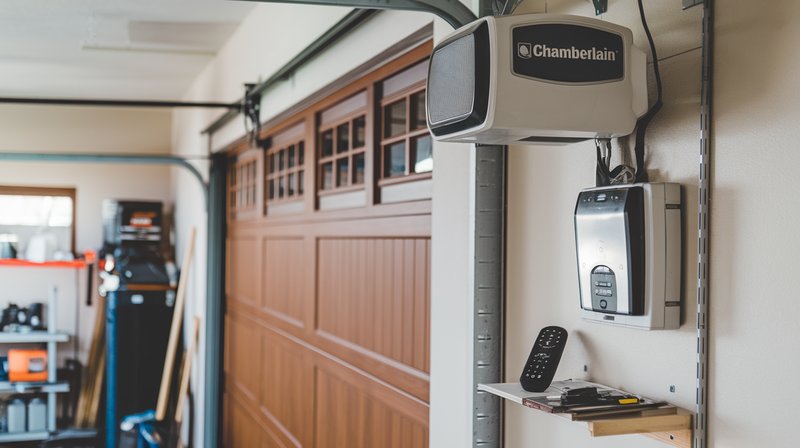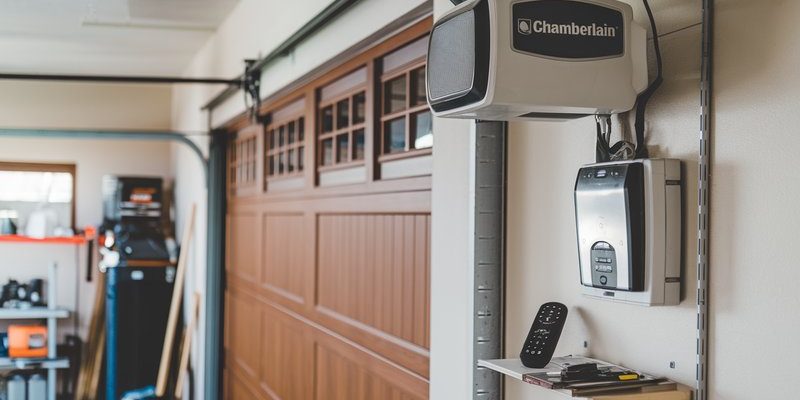
First off, you might be wondering why the garage door opener is important. It’s more than just a gadget; it’s about convenience, security, and the overall functionality of your garage. Think of it as the unsung hero in your garage space—the one that makes everything easier. There are various types available, from chain drives to belt drives, and trusted brands like LiftMaster and Chamberlain have been around long enough to earn their stripes. But how do you know what’s right for you? Let’s dive into the world of garage door openers.
Understanding Different Types of Garage Door Openers
Garage door openers come in different styles, and understanding these can help narrow down your choices.
– Chain Drive: This type uses a metal chain to pull the door up and down. They’re generally affordable and reliable, perfect for a detached garage if budget is a concern. However, they tend to be noisier than other types, which could be a downside if your garage is close to living areas.
– Belt Drive: As the name suggests, this one uses a rubber belt to operate the door. They are much quieter than chain drive openers, making them ideal if you want a peaceful environment. While they can be slightly more expensive, their smooth operation often justifies the cost.
– Screw Drive: This style uses a threaded rod to lift the door. They typically need less maintenance because they have fewer moving parts. If you’re looking for something that’s both efficient and low-maintenance, screw drive openers might be your best bet.
– Direct Drive: In these models, the motor itself moves along the track, which dramatically reduces noise. These are great for homeowners who prioritize quiet operation, but can sometimes come with a higher price tag.
Each type has its perks, so it’s essential to evaluate what aspects matter most to you.
Considering Power and Weight Requirements
Now that you know the types, let’s talk power. Garage door openers come in different power levels, usually measured in horsepower (HP). The power you need largely depends on the weight and size of your garage door.
– 1/2 HP is typically sufficient for standard doors that weigh around 300 pounds.
– 3/4 HP should be your choice if you have a heavier, insulated door or if your garage door is larger than usual.
You might be wondering, “How do I know the weight of my garage door?” A good starting point is to check the manual if you have one or ask the installer. If you’re unsure, just remember: investing just a little more in power might save you hassles down the road, especially if you decide to upgrade your garage door in the future.
Wireless Controls and Smart Features
With technology evolving faster than a speeding bullet, many modern garage door openers now come with smart features. Picture this: you pull into your driveway, and the garage door opens on its own because it recognizes your smartphone. Neat, right?
– Smart Home Integration: Many openers can connect to your Wi-Fi, allowing you to control them with smart assistants like Alexa or Google Assistant. You can also find apps that let you open or close your garage door from anywhere.
– Battery Backup: What if the power goes out? Some garage door openers come with battery backups to ensure you can still operate your door. This is particularly useful if you live in an area prone to power outages.
– Remote Controls: Traditionally, we relied on remotes, but newer systems can offer features like rolling-code technology for added security. This makes it much harder for anyone to intercept your signal, which is always a plus.
These smart features might seem unnecessary, but they can significantly enhance convenience and security.
Installation Options: DIY vs. Professional Help
When it comes to installation, you have two primary paths: a DIY approach or bringing in a professional. Here’s the thing—if you’re the handy type and love tackling projects, installing the opener yourself can be a fun experience. But be aware, this comes with its own challenges.
– DIY Installation: Many brands provide detailed instructions, and if you’re comfortable with tools, this could save you some cash. However, be prepared for potential hiccups. You might encounter unexpected issues, such as special wiring.
– Professional Installation: If you’re not confident or simply want peace of mind, hiring a professional can be the way to go. They know the ins and outs, potentially saving you time and effort in the long run. Just remember that this option will add to the overall cost of getting your new garage door opener.
Choosing how to install it can significantly affect your experience, so pick the route that aligns with your comfort and budget.
Exploring Brands: LiftMaster vs. Chamberlain
With so many brands out there, it can be overwhelming to find the perfect one. Two of the heavyweights are LiftMaster and Chamberlain, both well-respected in the industry.
– LiftMaster: This brand is known for its professional-grade products. They offer a wide range of openers that include robust features but often come at a higher price point. If you’re looking for reliability and advanced tech, LiftMaster might be the way to go.
– Chamberlain: Often seen as the more budget-friendly option, Chamberlain also offers several smart technology features. Their models are usually easy to install and can be a great choice for those new to garage door openers.
Understanding the differences between these two brands can point you toward a choice that fits your budget and needs.
Cost Considerations and Budgeting
Let’s delve into costs. Garage door openers come in a range of prices based on their features and branding.
– Basic Models: You can find basic models starting at around $150. These will get the job done but may lack advanced features like smart controls.
– Mid-Range Models: Ranging from $200 to $400, these deliver a balance between price and features, often including quieter operation and some smart functionality.
– Premium Models: If you’re looking at high-end options, expect to spend anywhere from $400 and above. These typically come packed with extras, such as battery backups and advanced security systems.
When choosing, stick to your budget but remember that investing a bit more might pay off in the long run in terms of durability and additional features.
Troubleshooting Common Garage Door Opener Issues
Just as coffee can sometimes spoil, garage door openers can throw surprises your way. Here’s where troubleshooting comes into the picture.
– Opener Doesn’t Respond: This can be due to dead batteries in the remote or a power outage. Check the batteries first; if they’re functional, ensure the opener is plugged in or connected to a power source.
– Door Stops Midway: Misalignment often causes this issue. Take a step back and look at the tracks; they should be clean and correctly aligned. Sometimes, all it takes is a little adjustment to get it back on track.
– Noisy Operation: If your chain drive opener sounds like a beast every time it operates, consider applying lubricant to the moving parts or even switching to a belt drive for a quieter experience.
Being prepared for these common issues can save you a lot of time and frustration, so having a troubleshooting plan is always a smart move.
Maintenance Tips for Longevity
Just like you’d maintain your car for longevity, garage door openers also benefit from regular care.
– Regular Lubrication: Every few months, apply lubricant to the moving parts. This helps reduce wear and tear and ensures smoother operation.
– Check the Sensors: Ensure the safety sensors are clean and properly aligned. If they get dusty or shifted out of place, they might not work correctly, causing your door to malfunction.
– Inspect the Door: Look for any signs of wear on the door itself. A door that’s misaligned can strain the opener, causing issues over time.
Performing these maintenance checks can extend the lifespan of your garage door opener, making sure it serves you well for years to come.
Final Thoughts: Making the Right Choice
Choosing a garage door opener for your detached garage may seem daunting, but breaking it down into bite-sized pieces can simplify the process. Remember to consider the type of opener, power requirements, features you might want, and installation options. Brands like LiftMaster and Chamberlain offer reliable choices, and setting a budget is crucial for a smooth purchasing experience.
Whether you go the DIY route or opt for professional installation, keeping your opened well-maintained will ensure it serves you well. So grab your coffee, take a moment to reflect, and make that choice with confidence! The right garage door opener will make your life easier and more secure, giving you more time to enjoy what matters most.
